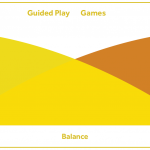 With the support of Lego Foundation we have produced a white paper for Facilitating play. Play is a essential for children’s learning in all kinds of activities. However, play can also get stuck in dead end, increase segregation and be meaningless. The essential element is progressive play. The book is just out, it is available totally free in here.
With the support of Lego Foundation we have produced a white paper for Facilitating play. Play is a essential for children’s learning in all kinds of activities. However, play can also get stuck in dead end, increase segregation and be meaningless. The essential element is progressive play. The book is just out, it is available totally free in here.
Precise feedback for schools and classes
In Finland, in Nummenkylä and Siimapuisto day-care centres, we have piloted progressive feedback, in which it is possible to give timely feedback for the educators and principals to understand, follow and steer the development processes in real-time in the school. In the pilot system, each educator is trained as an observer and each observer observes a random group once a month. This practice gives the keys for educational development to the educators and principals, with the possibility to share the results with parents and children for deepr cooperation.
Facilitating play
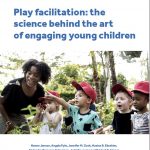 At Lego Foundation, we have been writing a white paper about Play facilitation: the science behind the art of engaging young children. The writers are Hanne Jensen, Angela Pyle, Jennifer M. Zosh, Hasina B. Ebrahim, Alejandra Zaragoza Scherman, Jyrki Reunamo and Bridget K. Hamre. Play is important in developing skills, learning, solving problems, in relationships, health and societal development. However, not all play is beneficial. Play facilitates learning when it is joyful, meaningful, actively engaging, iterative and socially interactive. In the paper, it is considered important that play is integrated to all activity, including instruction. The paper includes a lot of research results based on our project. Thank you for everyone for their contribution. The paper is disseminated world-wide by Lego and it is launched officially 27 February 2019 in South Africa.
At Lego Foundation, we have been writing a white paper about Play facilitation: the science behind the art of engaging young children. The writers are Hanne Jensen, Angela Pyle, Jennifer M. Zosh, Hasina B. Ebrahim, Alejandra Zaragoza Scherman, Jyrki Reunamo and Bridget K. Hamre. Play is important in developing skills, learning, solving problems, in relationships, health and societal development. However, not all play is beneficial. Play facilitates learning when it is joyful, meaningful, actively engaging, iterative and socially interactive. In the paper, it is considered important that play is integrated to all activity, including instruction. The paper includes a lot of research results based on our project. Thank you for everyone for their contribution. The paper is disseminated world-wide by Lego and it is launched officially 27 February 2019 in South Africa.
Physical activity of 1-3-year-old children in daycarecentres
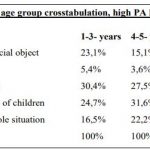 Virpi Katajarinne has written a rather unique graduate thesis. In her thesis, Virpi studies, for example, how 1-3-year-old children’s physical activity varies in different activities. This helps early educators to focus on important activities. It is also interesting to see how children’s emphasis on physical activity changes gradually from non-social subljects to a peer related activity and later on group-related physical activity (enlarge the table on the left by clicking it). It is also interesting to see how physical activity seems not to be connected with learning than with older children, perhaps Laevers’ involvement scale does not find the motor learning taking place with younger children? Virpi has written her thesis in English, which is rare in our department. Use this rare opportunity and read Virpi’s thesis yourself here!
Virpi Katajarinne has written a rather unique graduate thesis. In her thesis, Virpi studies, for example, how 1-3-year-old children’s physical activity varies in different activities. This helps early educators to focus on important activities. It is also interesting to see how children’s emphasis on physical activity changes gradually from non-social subljects to a peer related activity and later on group-related physical activity (enlarge the table on the left by clicking it). It is also interesting to see how physical activity seems not to be connected with learning than with older children, perhaps Laevers’ involvement scale does not find the motor learning taking place with younger children? Virpi has written her thesis in English, which is rare in our department. Use this rare opportunity and read Virpi’s thesis yourself here!
Progressive Feedback in Tzu-Chi University, Taiwan
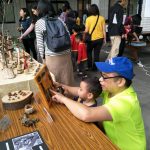 In Tzu-Chi University, the early educators have completed the final exhibition and sharing workshop 23 November 2018. This sharing exhibition of the project lasted for three weeks in front of university library., On 17th November was the final sharing workshop including 40 minutes of statistic report of observation and 3 hour oral presentations of development tasks(8 preschools presented), 1 hour of educational market (11 preschools presented), and one hour of river plan workshop. There were also parents bringing their child to try to activities in the educational market. The six oral reports were excellent in developing the curriculum, and educators said that they learned a lot from the project!
In Tzu-Chi University, the early educators have completed the final exhibition and sharing workshop 23 November 2018. This sharing exhibition of the project lasted for three weeks in front of university library., On 17th November was the final sharing workshop including 40 minutes of statistic report of observation and 3 hour oral presentations of development tasks(8 preschools presented), 1 hour of educational market (11 preschools presented), and one hour of river plan workshop. There were also parents bringing their child to try to activities in the educational market. The six oral reports were excellent in developing the curriculum, and educators said that they learned a lot from the project!
Collaboration with Fun Learning in China
 Kindergarten heads, teachers and parents have the liberty to look at the data from a cross national perspective, compare it with science of learning as well as ECD goals, and decide the best way forward.The Orientation Project provides practical and meaningful instruments for researching, monitoring and evaluating early learning. We have started collaboration with the Fun Learning approach, starting in China.
Kindergarten heads, teachers and parents have the liberty to look at the data from a cross national perspective, compare it with science of learning as well as ECD goals, and decide the best way forward.The Orientation Project provides practical and meaningful instruments for researching, monitoring and evaluating early learning. We have started collaboration with the Fun Learning approach, starting in China.
Funding for the research
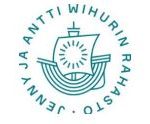 Jenny & Antti Wihuri foundation has granted Jouni Veijalainen 24 000 euro to finish his doctoral thesis about children’s self-regulation in early education. The same foundation also granted Outi Arvola 7 000 euro to complete her doctoral thesis on multicultural children in early education. Both are using project data on their thesis. Congratulations!
Jenny & Antti Wihuri foundation has granted Jouni Veijalainen 24 000 euro to finish his doctoral thesis about children’s self-regulation in early education. The same foundation also granted Outi Arvola 7 000 euro to complete her doctoral thesis on multicultural children in early education. Both are using project data on their thesis. Congratulations!
Chinese Teacher Education cooperation
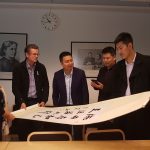 A dedicated group of Early Education experts from China visited University of Helsinki and Finland 26-30 September. The visitors included Dong Li (China next generation education foundation early childhood education federation), Gavin (CEO of the Lead Baby Education Group), Jackie (Education director of Lead Baby Education Group), Ye Fei (China Early Childhood Education Weekly, Founder and chief editor, Blue sky club, Founder), Yuan Shenggang (online Education platform, Founder) & Liu Hong (CEO of the Beijing Tayaseine Education Ltd., Co). We work for cooperation in teacher education and development of Chinese early education. The delegation visited also Nummenkylä daycare center to have a first hand experience on Progressive feedback.
A dedicated group of Early Education experts from China visited University of Helsinki and Finland 26-30 September. The visitors included Dong Li (China next generation education foundation early childhood education federation), Gavin (CEO of the Lead Baby Education Group), Jackie (Education director of Lead Baby Education Group), Ye Fei (China Early Childhood Education Weekly, Founder and chief editor, Blue sky club, Founder), Yuan Shenggang (online Education platform, Founder) & Liu Hong (CEO of the Beijing Tayaseine Education Ltd., Co). We work for cooperation in teacher education and development of Chinese early education. The delegation visited also Nummenkylä daycare center to have a first hand experience on Progressive feedback.
DO
Supporting children’s special needs
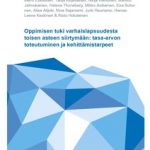 Two new articles on supporting children’s special needs have been published a Finnish Government publication. The articles are based on the Orientation Project data with 9554 observation of children with special needs with a random sample covering 40% of Finnish early education. Unfortunately only the abstracts are in English and Swedish.
Two new articles on supporting children’s special needs have been published a Finnish Government publication. The articles are based on the Orientation Project data with 9554 observation of children with special needs with a random sample covering 40% of Finnish early education. Unfortunately only the abstracts are in English and Swedish.
Tunisia, World bank & UNICEF cooperation
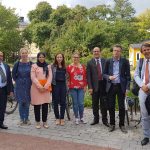 The Tunisian Ministry of Women, Family and Children partnered with Fun Academy to provide equitable and high-quality early childhood education and care (ECEC) in Tunisia. The World Bank and UNICEF are providing the international and technical support for this initiative. The delegation visited University of Helsinki in August to seek possibilities for early childhood development (ECD) and protection. The Orientation Project provides excellent auditing tools to observe how lessons, activities and routines within an early years setup are correlated with ECD outcomes.
The Tunisian Ministry of Women, Family and Children partnered with Fun Academy to provide equitable and high-quality early childhood education and care (ECEC) in Tunisia. The World Bank and UNICEF are providing the international and technical support for this initiative. The delegation visited University of Helsinki in August to seek possibilities for early childhood development (ECD) and protection. The Orientation Project provides excellent auditing tools to observe how lessons, activities and routines within an early years setup are correlated with ECD outcomes.